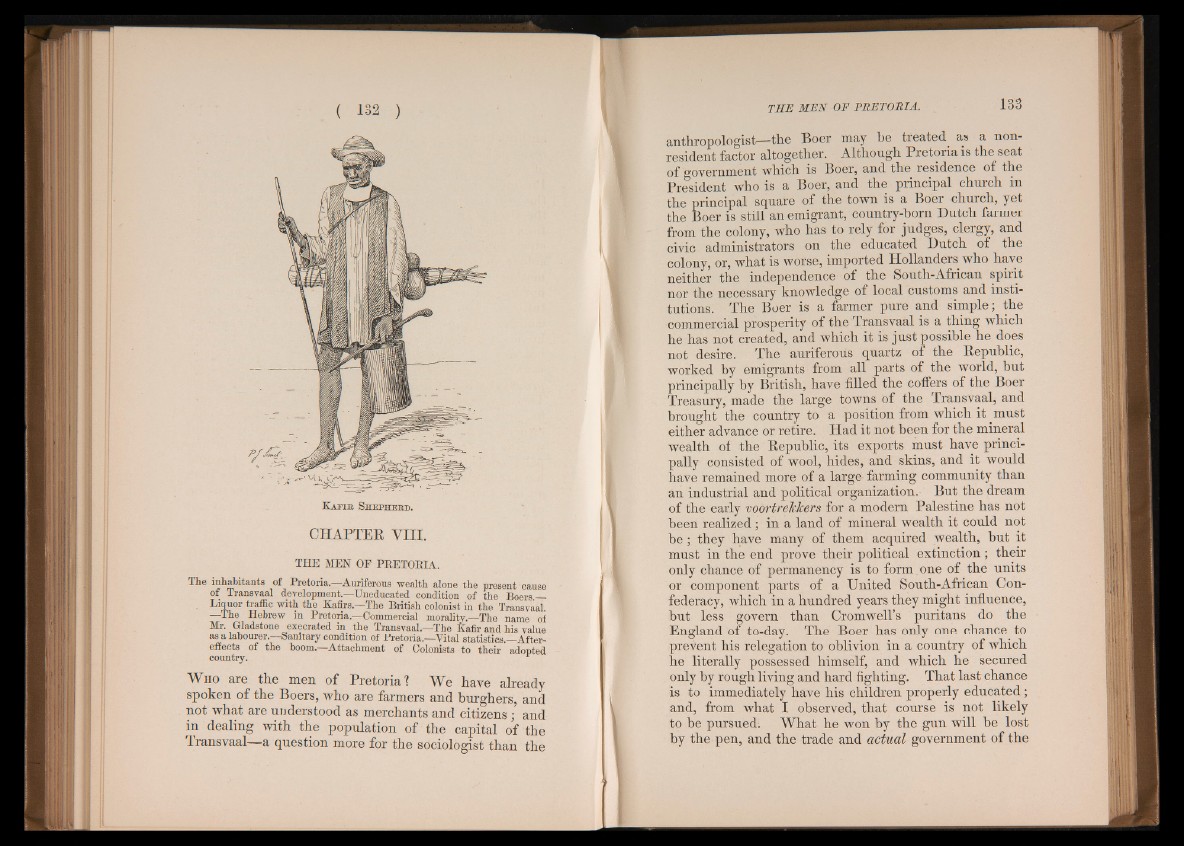
CHAPTER VIII.
THE MEN OF PRETORIA.
Tie inhabitants of Pretoria. Auriferous wealth alone the present cause
of Transvaal development—Uneducated condition of the Boers —
, Liquor traffic with the Kafirs.gjThe British colonist in the Transvaal.
—-The Hebrew in Pretoria.—Commercial morality.—The name of
Mr. Gladstone execrated in the Transvaal.—The Kafir and his value
as a labourer.—Sanitary condition of Pretoria.—Vital statistics.—Aftereffects
of the boom.—Attachment of Colonists to their adopted
country.
Who are the men of Pretoria? We have already
spoken of the Boers, who are farmers and burghers, and
not what are understood as merchants and citizens ; and
in dealing with the population of the capital of the
Iransvaal a question more for the sociologist than the
anthropologist—the Boer may be treated as a nonresident
factor altogether. Although Pretoria is the seat
of government which is Boer, and the residence of the
President who is a Boer, and the principal church in
the principal square of the town is a Boer church, yet
the Boer is still an emigrant, country-born Dutch farmer
from the colony, who has to rely for judges, clergy, and
civic administrators on the educated Dutch of the
colony, or, what is worse, imported Hollanders who have
neither the independence oi the South-African spirit
nor the necessary knowledge of local customs and institutions.
The Boer is a farmer pure and simple; the
commercial prosperity of the Transvaal is a thing which
he has not created, and which it is just possible he does
not desire. The auriferous quartz of the Republic,
worked by emigrants from all parts of the world, but
principally by British, have filled the coffers of the Boer
Treasury, made the large towns of the Transvaal, and
brought the country to a position from which it must
either advance or retire. Had it not been for the mineral
wealth of the Republic, its exports must have principally
consisted of wool, hides, and skins, and it would
have remained more of a large farming community than
an industrial and political organization. But the dream
of the early voortrekJcers for a modern Palestine has not
been realized ; in a land of mineral wealth it could not
b e ; they have many of them acquired wealth, but it
must in the end prove their political extinction; their
only chance of permanency is to form. one of the units
or component parts of a United South-African Confederacy,
which in a hundred years they might influence,
but less govern than Cromwell’s puritans do the
England of to-day. The Boer has only one chance to
present his relegation to oblivion in a country of which
lie literally possessed himself, and which he secured
only by rough living and hard fighting. That last chance
is to immediately have his children properly educated;
and, from what I observed, that course is not likely
to be pursued. What he won by the gun will be lost
by the pen, and the trade and actual government of the